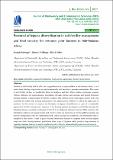Potential of legume diversification in soil fertility management and food security for resource poor farmers in Sub-Saharan AfricaPotential of legume diversification in soil fertility management and food security for resource poor farmers in Sub-Saharan Africa

View/
Date
2017-12-30Author
Kalonga, Joseph
Mbega, Ernest
Mtei, Kelvin
Metadata
Show full item recordAbstract
Declines in soil fertility and its effect on crop production is a major problem in sub Saharan Africa. It is a
major factor limiting crop production and consequently food security in agrarian communities. The causes
of soil fertility decline on smallholder farms in Southern and East Africa include continuous cropping
without sufficient soil replenishment, degradation through erosion and leaching, and limited biological
nitrogen-fixation. Using inorganic fertilizers to address this problem doesn’t add organi c matter and is not
accessible for small scale farming communities who cannot access fertilizer or afford the high costs of
purchase. In this review, we explore the literature on legume diversification as part of a sustainable
approach to fertility management. Legumes in the farming systems can improve soil fertility through the
rhizobium-legume symbiotic relationship (referred to as biological nitrogen fixation (BNF), and have the
potential to enhance soil organic matter and conserve other soil resources a s well. In addition legumes can
provide multipurpose roles by contributing food, fodder and fuel to households. The information that is
compiled in this review is vital to guide research efforts and farmers to integrate more relevant legume
crops into their farming systems, particularly those types of legumes which produce large amounts of
vegetative biomass that can be used to ameliorate soil fertility for enhanced food production and security
